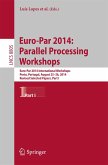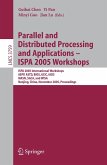Towards Next Generation Grids is the fifth volume of the CoreGRID series. Organized jointly with the Euro-Par 2007 conference, The CoreGRID Symposium intends to become the premiere European event on Grid Computing. The aim of this symposium is to strengthen and advance scientific and technological excellence in the area of Grid and Peer-to-Peer Computing. It is organized by the CoreGRID Network of Excellence funded by the European Union under the sixth Framework Programme. CoreGRID aims at building a virtual European-wide Research Laboratory in Grid and P2P technologies and involves 41 partners from 19 countries gathering 300 researchers and PhD students.
Towards Next Generation Grids is designed for a professional audience composed of researchers and practitioners in industry. This volume is also suitable for advanced-level students in computer science. It covers several topics:
* Service Level Agreement and Quality of Service
* Trust, Security and Virtual Organization
* Programming with Software Components
* Communication and Networking
* Job, Information and Resource Management
* Programming Methodology
* Workflow Management
* Data Management
Dieser Download kann aus rechtlichen Gründen nur mit Rechnungsadresse in A, B, BG, CY, CZ, D, DK, EW, E, FIN, F, GR, HR, H, IRL, I, LT, L, LR, M, NL, PL, P, R, S, SLO, SK ausgeliefert werden.









